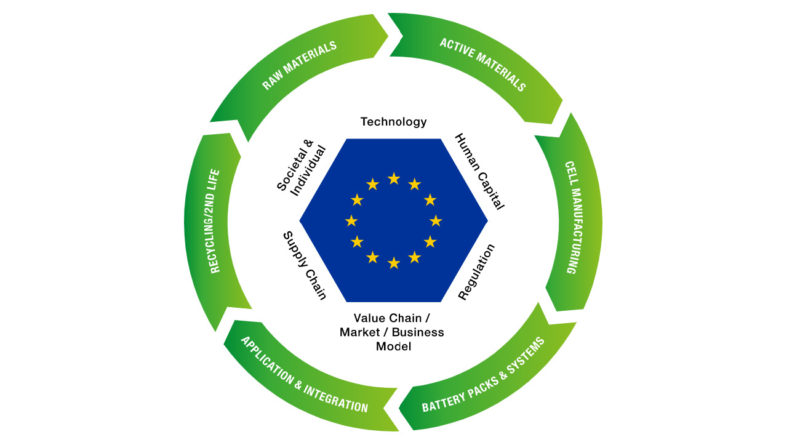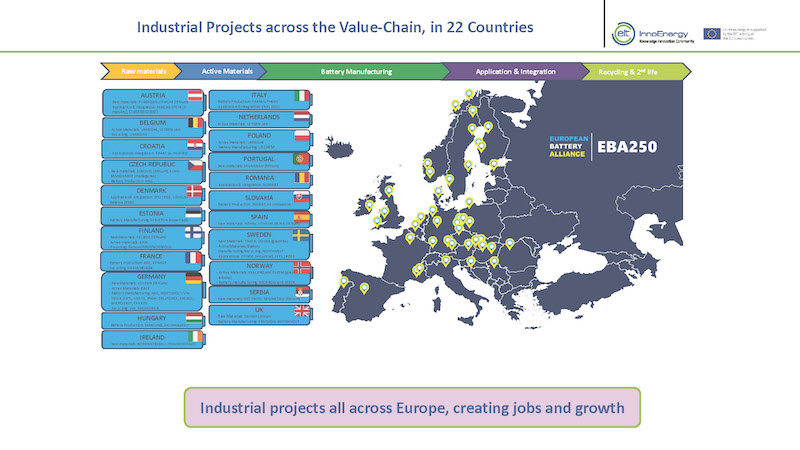
European Batteries, a Proven Piece of the Clean Energy Transition, and a Booster for the Economic Recovery of the Continent
Three years only after the establishment of the European Battery Alliance, the European Union is already outpacing China in terms of investments in electric mobility. In 2019, it has captured 3,5 times more battery related investment than China with a record investment volume of €60bn1.
The European Union has now found a well-earned place in the global race towards technological and industrial leadership in the battery value-chain. We are on the right track, and we have progressed considerably, yet the European Battery Alliance, powered by EIT InnoEnergy, can create 1 million jobs and 200Bn€ of new GDP in the next 30 months if we accelerate.
At the same time, the European Battery Alliance can serve as a blueprint for other strategic industrial value chains, as identified by the European Commission in the Communication on the new Industrial Strategy for Europe in March 2020.
European batteries, an enabler for sustainable growth, are at the heart of the Green Deal
The European Green Deal has set the European Union on the path to climate-neutrality, with the ambition to pioneer a model of prosperity that would decouple economic growth from, among others, GHG emissions.
This shift is only feasible if this new model secures our industrial future, with the promise of boosting industrial jobs and the corresponding skills on our territory. It must also contribute to reducing our vulnerabilities, primarily our dependence on external players for the most critical bricks of our clean energy transition.
This is precisely the aim of the new Industrial Strategy for Europe, which should serve as a compass in designing the next steps of this transition.
In this context, the battery value chain is essential as this technology is the cornerstone of the decarbonisation of both the transport and power sectors. These two sectors account together for 58% of the total CO2 emissions in the European Union in 2020, with the transport sector expected to become the largest contributor to CO2 emissions as of this date2. Batteries also provide the flexibility required for the safe and cost-efficient operation of a power system largely based on renewables, and constitute the core of the drivetrain of electric vehicles, with a prospect of powering about 80% of the total cars stock in the European Union in 20503. Hence, batteries are a fundamental piece of achieving the clean energy transition.
The European Battery Alliance (EBA), launched in October 2017 by Vice-President Maroš Šefčovič and powered by EIT InnoEnergy, took up this challenge. The EBA has laid the foundation of, and grown, a sustainable, competitive, innovative battery value-chain in the European Union able to create a fresh annual new market of 250Bn€ (about the size of the economy of Denmark), which will create up to 4Mn direct and indirect jobs.
Today, above five hundred organisations along the entire value-chain have come together within the EBA, delivering already to meet the rapidly rising demand for batteries in the European Union, striving to supply state-of-the-art batteries produced with the lowest possible environmental footprint.
The European Battery Alliance has already a strong track record. It started by focusing on the weakest link of the value-chain, the production of battery cells, and was instrumental in setting up the 26 GWh of manufacturing capacity currently in operations in the European Union. In 2019, Northvolt, which launched works for the construction of two gigafactories for the production of next generation lithium-ion batteries, raised over 1Bn$ and was the first new company from the ecosystem to become a unicorn. In total, the European Battery Alliance has enabled 100Bn€ of investment, while the ecosystem started from scratch. Thanks to such achievements, the European Union is closing the investment gap with its competitors, with investment in electric mobility having reached 60Bn€ in 2019 compared to 17Bn€ in China the same year4.
A lot still needs to be done to seize the full benefits of an integrated European value chain
With nine battery factories under construction, and about thirteen more planned, the focus shifted to the upstream segment of the value-chain with the ethical sourcing and processing of raw materials, through domestic extraction and processing of critical raw materials, and to recycling. Indeed, domestic extraction and processing of lithium (but also graphite and manganese) constitutes an opportunity to address the surge in demand for lithium-ion batteries in the European Union, especially as it is expected to rise by 30% per year in the next ten years, translating in a multiplication of our need in lithium by 18 by 2030 and by 60 by 20505.
To date, the four lithium extraction projects supported by EIT InnoEnergy would be sufficient to cover almost half of the battery ecosystem’s needs by 2025, in addition to generating 2Bn€ of new GDP and creating up to 7000 jobs.
The support of the European Commission and the European Investment Bank, as well as the assistance of national and local authorities, is essential to de-risk these projects, to facilitate the permitting process, and to strengthen public acceptance for mining activities. Indeed, Europe cannot afford to leave these resources unattended, considering that our standards for mining licenses are among the highest in the world, and that the technologies for sustainable extraction are available. In addition, the upcoming revision of the Batteries Directive will offer an opportunity to settle on ambitious sustainability requirements and to promote recycling to the benefit of consumers and citizens, while boosting the competitiveness of our most innovative companies.
A proven concept, the European Battery Alliance can lead the way for other key strategic industrial value chains in the transition to a low-carbon economy and for the recovery
Indeed, the philosophy of the European Battery Alliance is fully aligned with the objectives of the Recovery Plan for Europe: it contributes and will continue to contribute to the recovery by leveraging its ecosystem and accelerating its activities. It provides a direct response to the challenges that arose from the crisis, by creating jobs and growth, in the short term. Working together with the stakeholders, we identified in Spring 2020 already, and defined the action plan, that accelerating EBA can create 1Mn jobs and generate 200Bn€ of GDP in the next thirty months, coupled with ensuring that the recovery is coherent with our climate-neutrality objective. Therefore, the Member States should be invited to integrate batteries in their Recovery and Resilience Plans, possibly under one of the European Flagships, to secure immediate results in their effort to restart their economy, but also long-term benefits for the competitiveness of their industry and the success of their clean energy transition.
These considerations, and the very purpose of the European Battery Alliance, are more important than ever in the aftermath of the coronavirus pandemic.
The disruption of global supply-chains at the worst of the crisis provided further proof that replacing the dependence of the European Union on (mostly imported) fossil fuels by (also imported) technologies and raw materials puts our economy, and our very ability to achieve the clean energy transition, at risk.
Here, our response must be to accelerate the development – or the reshoring – of resilient industrial value-chains, able to withstand shocks of such nature, but also of reigniting growth when most needed. The work on identifying the most critical industrial value-chain is well under way, and here again, the battery ecosystem is a trailblazer.
Considering the ambition of the Recovery Package, as the European Union and the Member States work on a coordinated response to the economic crisis, there is a lot to gain in adopting measures and supporting projects in the framework of strategic European industrial value-chains. After vetting them against their contributions to an enhanced resilience and to CO2 emissions reduction, it is clear that prioritising projects with an innovative content will make a lasting difference for Europe’s competitiveness, jobs and re-industrialisation. EIT InnoEnergy is an investor and accelerator in sustainable energy technologies supported by the European Institute for Technology.





